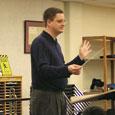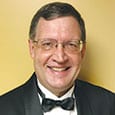Perhaps the most important skill a director can develop is the ability to establish and maintain discipline in a rehearsal. One may be able to teach the Dahl Sinfonietta to 7th graders, but it will not matter without an environment that is conducive to learning. Discipline is not just a fancy word for punishment and should not be viewed as a negative term.
Good discipline requires more than convincing a group of students to sit quietly. Some aspects of a well-disciplined band include:
• Doing everything possible to maximize rehearsal time.
• Having all needed materials at every rehearsal.
• Being attentive and engaged at all times with, as Gary Garner says, “brief moments of levity” to provide mental breaks.
• Following established rehearsal procedures such as eye contact with the director, horns up at the appropriate time, and raising a hand before asking a question.
Rules and Routines
Rules provide a starting point for communicating your expectations to students. It is better to have a few rules that are broadly applied than to write a large number of rules for every situation. Every rule tempts students to find loopholes. Some rules that can help make rehearsal more efficient include:
• Students should be in place and ready to play at the tardy bell or, depending on time, moving toward their seats.
• Everyone ought to enter the room quietly. There should be no talking once the tardy bell has rung or the director has stepped on the podium.
• There is no playing allowed until students are instructed to do so by the director. This included warming up on your own or testing a reed.
• Students should use various sitting positions during the rehearsal. Ready position when resting during a piece of music and playing position when performing. Rest position may occasionally be used when students are allowed to sit back in the chair. At no time are students allowed to slump, let attention wander or rest their instruments on the floor.
• Instruments come up with the director’s arms come up to begin conducting.
• Students stop playing when the director cuts them off. This is a huge pet peeve of mine. All groups should know to do this but many do not get it, including mine each fall.
• Every student must have a pencil on his or her stand and use it during rehearsal.
• All music and handouts must be kept organized in a folder or binder where students can easily find them.
• Students are expected to number the measures of all pieces of music that are passed out. This cuts down on dead time when students are told to go to a certain point in the music.
• The rehearsal order should be posted on the board at the beginning of class. This allows students to have all the needed materials ready to go prior to the start of rehearsal.
Inappropriate Behavior
No matter how thoroughly you explain your expectations for behavior, eventually someone will mess up. Your approach to early problems will determine how many problems develop later. You must establish quickly that inappropriate behavior will not be tolerated in any form. An emotional reaction is not necessary. Usually it is enough to point out that something is wrong and then move on.
Remember that there are no small infractions and a consistent standard of behavior should be expected from every band member. Do not move on in a rehearsal until everyone in the group meets your behavior expectations in every way. Make sure you have full attention as you are talking to students even if this takes a few extra moments.
Directors are often taught in college to be overly firm in the beginning and relax later in the year, but one should not take this to an extreme and be mean to students. There is a difference between being firm with students and being vicious. Many directors have a hard time setting strict standards. We want to be liked and for students to enjoy music. I discovered after a difficult first few months of teaching middle school is that if I am consistent in my expectations at the beginning of the year, I can still joke around some and have effective rehearsals later. The goal is not to go through the entire year policing behavior but to set a precedent early on.
I have found that one key is to address the behavior, not the student. Correcting student actions does not have to be personal. I have observed that raising your voice, particularly when done frequently, just causes students to tune you out. Also, do not allow students to draw you into a debate about any misbehavior.
Vary the way that you address problems. Instead of simply telling students not to do something, a director can stop, look at the students, and wait for them to correct themselves. It also works to move closer to a student as you continue teaching and you use physical cues such as pointing to your eyes to remind a student to watch or pay attention.
Consequences
Although most students need little more than a verbal reminder to correct behavior, it is important to have a clear set of consequences for more serious problems. Students are more likely to behave correctly when they understand the response to expect for misconduct. It is important to keep in mind that most students are not going to deliberately harm a rehearsal, so always correct verbally before moving to disciplinary consequences. If a student has been verbally corrected in class and continues the improper action, he can be moved to a lower chair in the section for the day or until the next chair audition. If this lower seat does not produce the intended effect, consider moving the student to a special chair closer to the band director. Be sure to explain the reasons for the move and do not single the student out.
I advise against having the student put down an instrument to move to a designated time-out area. It is always preferable to keep a misbehaving student involved in class somehow than to set them apart with nothing to do. If behavior becomes so disruptive that a student needs to pack up, it is probably time to rely on the administration. Be sure to communicate with parents. For every parent who may seem critical of your disciplinary intentions there are likely many others who appreciate these efforts.
A Focus on Learning
Just because students are quiet does not mean they are listening. As I discussed in a previous article (Classes That Captivate), there are a number of techniques that keep band members engaged during rehearsals. These include varying your tone of voice, asking frequent questions, getting off the podium from time to time, and recognizing when to move on to something new in rehearsal.
A Good Start
The first year is the most important in the development of good playing and rehearsal habits. Beginning classes should be held to the same standards as the concert band. If talking is not permitted in the top ensemble, do not allow it in beginning classes. If advanced players keep materials in a notebook and are expected to have a pencil everyday, the same should be expected from beginners. Such poor playing habits as bad posture and incorrect playing position should eventually be dealt with as discipline problems. In most cases a student who is not sitting up is failing to follow instructions.
Do not stay anchored to a podium for the entire rehearsal, particularly with younger players. By moving around the room, you stay closer to possible behavior problems and keep everybody focused. It is also easier to spot poor playing habits. Smaller beginning classes tend to be more informal and looser. I still hold everybody accountable for bringing materials and following instructions but maintain a more relaxed environment. If the bigger classes have been properly trained, the smaller ones will follow suit later.
One of the best bits of teaching advice I ever received was that “discipline comes before instruction.” Good teaching cannot occur until discipline has been established, and bad patterns of behavior can take considerable effort to break. For these reasons I try to impose a simple, consistent set of rules with clear consequences and attempt never to deviate from these high standards. By creating an atmosphere that makes it possible to take advantage of every minute of rehearsal time, students develop the expectation that rehearsals can be productive and positive.






